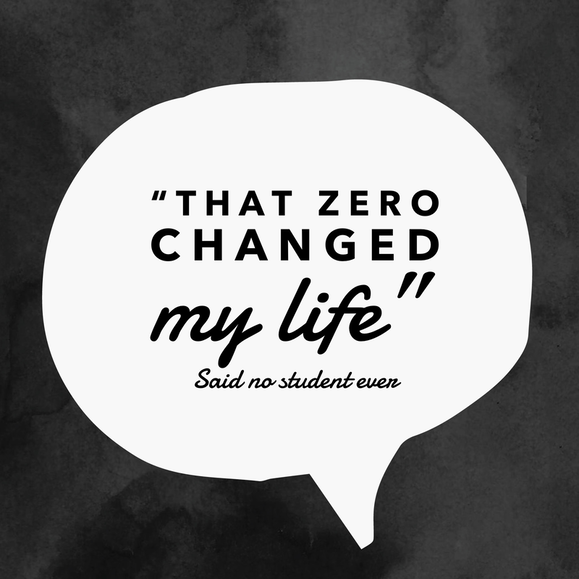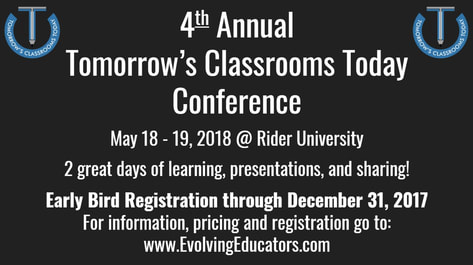|
Reflecting on an article I keep seeing on social media about the teacher getting fired for supposedly not abiding by the school’s grading policy. As a student, did I ever get a zero? Sure. Was it right? I guess. As a teacher, did some of my students receive zeros? Probably. Was it right? Probably not. As an instructional leader do I support the idea of students receiving zeros? In most cases, the answer is no. The bottom line is that we must exhaust all options to promote the success of each and every student regardless of how much they are driving us crazy or might seem too lazy to complete any work. I can remember as a teacher and team leader working with a small group of 7th grade students during my lunch. They had lost their way and learning was not a top top priority due to extenuating circumstances at home. They would come into my classroom and complete work that was way overdue in several of their classes. Over time they started to catch up and realized that we were not going to let them dig a deeper hole for themselves. Often I think we as educators believe it’s easier to teach students a life lesson by giving them a zero because we need to prepare them for the real world. When in fact we need to think about building supportive and engaging learning environments that not only show students that we care about them but also holds everyone accountable. I can remember as a student sitting out the first half of a basketball game because I was not holding up my end of a bargain. You know what? I deserved it. In more recent years, both as a teacher and administrator, there were a few occasions where students were not being responsible and they needed to be held accountable. Did that mean I got a zero? No. Something that meant so much to me was taken away for short while. I still needed to make up the work and learn the material. The whole zero thing is an easy way out for all parties involved. Now, if there is a point where all options have been exhausted and nothing has changed than we can have a discussion about who deserves what grade. The research is very clear in this area of education. John Hattie tells us that that a teachers estimate of student achievement has a 1.29 effect size. Additionally, Hattie tells us that teacher credibility has a .90 effect size. The research makes it abundantly clear that if teachers believe their students can achieve desired learning outcomes they will. On that same note, students know if you as a teacher are legit and subsequently will either rise to the occasion or not really care about learning. Students also know if you as an instructional leader are legit as it relates to keeping a pulse on what is or is not going on in school. The important thing here is to keep having these sorts of conversations with your colleagues, school stakeholders, and most importantly students. Take a look at my friend Eric Sheninger’s blog post on a similar topic from back in 2013: Keep fighting the good fight my friends! Brad has been an educator for more than 18 years as a coach, teacher, and administrator. He currently serves as a Director of Planning, Research, and Evaluation for the Chester School District in Chester, New Jersey. Brad is the 2017 NASSP National Assistant Principal of the Year and part of the ASCD Emerging Leaders Class of 2014. He is the co-founder and co-moderator of a weekly Twitter discussion for educators called #satchat. Brad has authored five books including the newly released Tech Request: A Guide for Coaching Educators in the Digital World. He presents nationally on leadership, teaching, and learning in the digital era. Brad currently serves as an adjunct professor in Drew University's Graduate School of Education. He also is a Google Certified Trainer and supports districts in implementing Google Apps for Education. Connect with Brad by following him on Twitter @thebradcurrie or visiting his company website at www.evolvingeducators.com.
1 Comment
A new year is upon us and with that comes an opportunity for educators to find new ways to enhance their effectiveness and promote the success of all students. Evolving as an educator should be something that is ongoing, that not only helps yourself grow, but others as well. Make it your mission this year to share the ideas and resources of others in the field of education, more than sharing your own ideas and resources, in order to underscore the importance that the world of education is no longer in isolation. Truly reflect on the ratio of what you put out there related to you as an individual versus others that you work with or that are part of your PLN. Truth be told, I really try to share the great work and ideas of others more than my own work. Social media posts, blogs, books, podcasts, events, instructional practices, leadership methods, and other educational items can be shared out both in the physical and virtual worlds. Whether at a faculty meeting or a tweet, great things are going on and other people need know about it. I really believe that every single educator out there has something great to share. Over the past ten years or so it has become easier to share out ideas and resources to the masses through various devices and web applications. I implore you to take it upon yourself this year and commit to sharing the ideas and resources that others have to offer. Don't get me wrong, it's still important to share out the wonderful things that you are doing as an educator. In fact, each morning I look forward to reading blogs and social media posts that others put out there. One tip that I like to promote is using a tool like Feedly to keep track of all your favorite online content. Most of what I share out across my social channels comes from Feedly. If I see a post from someone like Eric Sheninger or Monica Burns, I share it out directly from my Feedly feed. Other times I scroll through Facebook groups or Edsurge email insights to stay current with innovations. Once a day I really try to commit to sharing someone else's idea or resource. More often than not, I am able to share someone else's work two or three times a day. It could be on social media, via email, in an observation report, or through an informal conversation. One thing I do twice a month is push out a list of five educational resources to my colleagues. When I come across a great blog post, article, or tool I make sure to bookmark and include in the next blast. It's called the Bulldog Bulletin, as our mascot is the Bulldog. Staff enjoy reading it for the most part and will sometimes send me resources they come across to include in the next blast. On the same note, you might want to subscribe to the Evolving 8 which comes out on a monthly basis and contains many great resources. Right now take a few moments to reflect on how often or how little you share the work of others. Either way, somewhere around five shares a week is a good starting point. Pay special attention to what is going in your classroom, school, district, or organization and think about how what you experience can help other educators. At the end of the day people don't know what they don't know and it's up to you as a lead learner to let others to stay in the loop of best practices. Sharing brings inspiration to so many and motivates the unmotivated to try something new. It all goes back to helping students and the only way this can be accomplished is continuously sharpening your own saw and the saws of others.
 Image Credit: http://www.tots100.co.uk/wp-content/uploads/2015/04/shutterstock_101305459.jpg Image Credit: http://www.tots100.co.uk/wp-content/uploads/2015/04/shutterstock_101305459.jpg The 2016-2017 school year is upon us. Deep down inside everyone is ready to get back into the groove and move forward in a positive direction. With a new school year comes an opportunity to try new things that can compliment your existing culture. Some food for thought... Maintain Faculty Handbook on Google Docs Create an Adobe Spark Video Welcome Back Message Post Faculty Meeting Resources in Google Classroom Participate in a Hashtag Celebration Use Google Forms to Survey Students Post Daily Announcements on YouTube channel Push out important reminders to stakeholders utilizing Remind Play music for students during lunch with Pandora Brad Currie is the author of the newly released 140 Twitter Tips for Educators. His other books include All Hands on Deck: Tools for Connecting Educators, Parents, and Communities and Personalized PD: Flipping Your Professional Development. He is one of the founding partners of Evolving Educators LLC. Brad is a 2014 ASCD Emerging Leader and Google Certified Trainer. Brad currently serves as a K-8 Supervisor of Instruction and Dean of Students for the Chester School District in Chester, NJ. He speaks and presents nationally about technology integration. Learn more about Brad by following him on Twitter @bradmcurrie or visiting his website at www.bradcurrie.net.
That's right. You heard it here first. The Twitter feed never lies. Or at the very least it provides users the ability to access classroom, school, or district content that would otherwise be hard to obtain if observing from afar. Teachers, principals, and superintendents from around the world are taking 140 characters to get the message out and move the educational conversation forward.
Throughout the 2016-2017 school year Black River Middle School, by way of the @BlackRiverMS Twitter handle, was able to give stakeholder's an accurate depiction of learning experiences that take place across all grade levels and subject areas. Mrs. Moore's 4th grade classroom by way of the @MrsMooreFRSD Twitter handle was able to expand my knowledge as a parent of my son's daily learning experiences. The Falls Creek School District in Wisconsin leveraged the power of their hashtag #gocrickets and Twitter handle @fccrickets to promote all the great things that are taking place on a daily basis. There are so many great examples of how educators use Twitter to push the positive. Tweets highlight the great work of students, the innovative methods that teachers implement, and the exciting learning environment that leaders support. All it takes is a smartphone, the Twitter app, and a commitment to tell your story through social media. A great way to become acclimated to all the things that Twitter has to offer is by purchasing the book 140 Twitter Tips for Educators. It provides novice, intermediate, and expert users ideas and insight on how to make this invaluable tool work for you. At the end of the day, if you do not tell your classroom, school, or district story, someone else will and it could be wrong. Brad Currie is the author of the newly released 140 Twitter Tips for Educators. His other books include All Hands on Deck: Tools for Connecting Educators, Parents, and Communities and Personalized PD: Flipping Your Professional Development. He is one of the founding partners of Evolving Educators LLC. Brad is a 2014 ASCD Emerging Leader and Google Certified Trainer. Brad currently serves as a K-8 Supervisor of Instruction and Dean of Students for the Chester School District in Chester, NJ. He speaks and presents nationally about technology integration. Learn more about Brad by following him on Twitter@bradmcurrie or visiting his website at www.bradcurrie.net. We felt it was time. Time to recognize every student for all their contributions to school, society, and family. How could we make this happen? Very simple. Start a Students of the Day Initiative. Each day of the school year, one student per grade level is highlighted. By the end of the school year every child is recognized. Let's look at how this plays out..
The Students of the Day initiative provides each student with an opportunity to shine at some point during the school year. The smiles on their faces when they find out about their designation are priceless. It provides me with an opportunity to get to know each student a little bit better as the slide deck is created and conversations take place when the certificate is presented. Every once in a while a parent will be in the building when their child is recognized as the Student of the Month. This is an extra special moment that is captured on a camera and sent home with the child at day's end. There is no doubt that this sort of initiative can be make a good school even greater. Brad Currie is the author of All Hands on Deck: Tools for Connecting Educators, Parents, and Communities and the newly released Personalized PD: Flipping Your Professional Development. He is one of the founding partners of Evolving Educators LLC. Brad is a 2014 ASCD Emerging Leader and Google Certified Trainer. Brad currently serves as a K-8 Supervisor of Instruction and Dean of Students for the Chester School District in Chester, NJ. He is a Google Certified Trainer and speaks nationally about tech integration. Learn more about Brad by following him on Twitter @bradmcurrie or visiting his website at www.bradcurrie.net.
|
Archives
May 2020
Categories
All
|




 RSS Feed
RSS Feed
